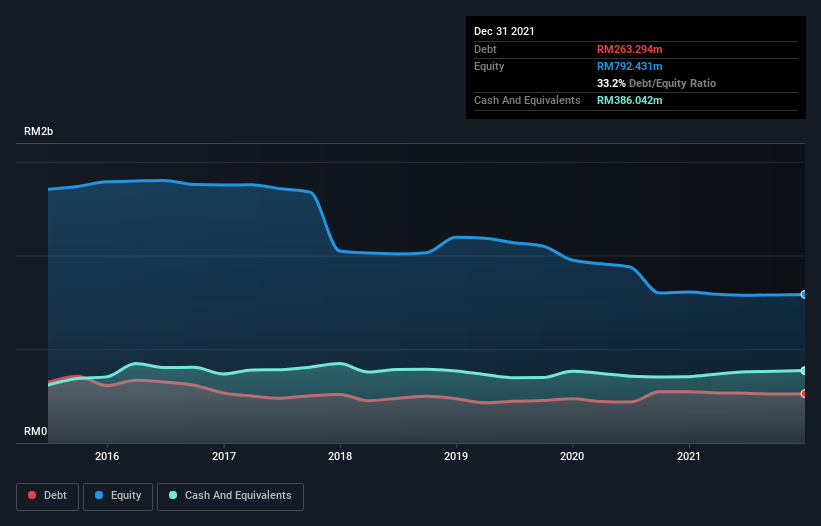- Malaysia
- /
- Paper and Forestry Products
- /
- KLSE:WTK
Health Check: How Prudently Does W T K Holdings Berhad (KLSE:WTK) Use Debt?
Warren Buffett famously said, 'Volatility is far from synonymous with risk.' So it seems the smart money knows that debt - which is usually involved in bankruptcies - is a very important factor, when you assess how risky a company is. As with many other companies W T K Holdings Berhad (KLSE:WTK) makes use of debt. But the more important question is: how much risk is that debt creating?
When Is Debt A Problem?
Debt is a tool to help businesses grow, but if a business is incapable of paying off its lenders, then it exists at their mercy. If things get really bad, the lenders can take control of the business. However, a more usual (but still expensive) situation is where a company must dilute shareholders at a cheap share price simply to get debt under control. Of course, the upside of debt is that it often represents cheap capital, especially when it replaces dilution in a company with the ability to reinvest at high rates of return. The first thing to do when considering how much debt a business uses is to look at its cash and debt together.
View our latest analysis for W T K Holdings Berhad
What Is W T K Holdings Berhad's Debt?
The chart below, which you can click on for greater detail, shows that W T K Holdings Berhad had RM263.3m in debt in December 2021; about the same as the year before. However, its balance sheet shows it holds RM386.0m in cash, so it actually has RM122.7m net cash.

How Strong Is W T K Holdings Berhad's Balance Sheet?
We can see from the most recent balance sheet that W T K Holdings Berhad had liabilities of RM188.4m falling due within a year, and liabilities of RM151.0m due beyond that. Offsetting this, it had RM386.0m in cash and RM34.2m in receivables that were due within 12 months. So it actually has RM80.9m more liquid assets than total liabilities.
This excess liquidity is a great indication that W T K Holdings Berhad's balance sheet is almost as strong as Fort Knox. On this view, lenders should feel as safe as the beloved of a black-belt karate master. Simply put, the fact that W T K Holdings Berhad has more cash than debt is arguably a good indication that it can manage its debt safely. There's no doubt that we learn most about debt from the balance sheet. But it is W T K Holdings Berhad's earnings that will influence how the balance sheet holds up in the future. So when considering debt, it's definitely worth looking at the earnings trend. Click here for an interactive snapshot.
Over 12 months, W T K Holdings Berhad reported revenue of RM395m, which is a gain of 12%, although it did not report any earnings before interest and tax. That rate of growth is a bit slow for our taste, but it takes all types to make a world.
So How Risky Is W T K Holdings Berhad?
Although W T K Holdings Berhad had an earnings before interest and tax (EBIT) loss over the last twelve months, it generated positive free cash flow of RM34m. So although it is loss-making, it doesn't seem to have too much near-term balance sheet risk, keeping in mind the net cash. With mediocre revenue growth in the last year, we're don't find the investment opportunity particularly compelling. The balance sheet is clearly the area to focus on when you are analysing debt. But ultimately, every company can contain risks that exist outside of the balance sheet. For example W T K Holdings Berhad has 3 warning signs (and 1 which shouldn't be ignored) we think you should know about.
If, after all that, you're more interested in a fast growing company with a rock-solid balance sheet, then check out our list of net cash growth stocks without delay.
Valuation is complex, but we're here to simplify it.
Discover if W T K Holdings Berhad might be undervalued or overvalued with our detailed analysis, featuring fair value estimates, potential risks, dividends, insider trades, and its financial condition.
Access Free AnalysisHave feedback on this article? Concerned about the content? Get in touch with us directly. Alternatively, email editorial-team (at) simplywallst.com.
This article by Simply Wall St is general in nature. We provide commentary based on historical data and analyst forecasts only using an unbiased methodology and our articles are not intended to be financial advice. It does not constitute a recommendation to buy or sell any stock, and does not take account of your objectives, or your financial situation. We aim to bring you long-term focused analysis driven by fundamental data. Note that our analysis may not factor in the latest price-sensitive company announcements or qualitative material. Simply Wall St has no position in any stocks mentioned.
About KLSE:WTK
W T K Holdings Berhad
An investment holding company, operates in the timber industry in Malaysia, Japan, Singapore, Taiwan, Australia, Thailand, and internationally.
Good value with adequate balance sheet.
Market Insights
Community Narratives




